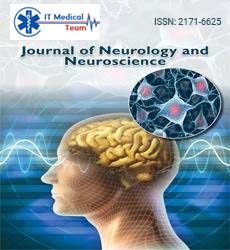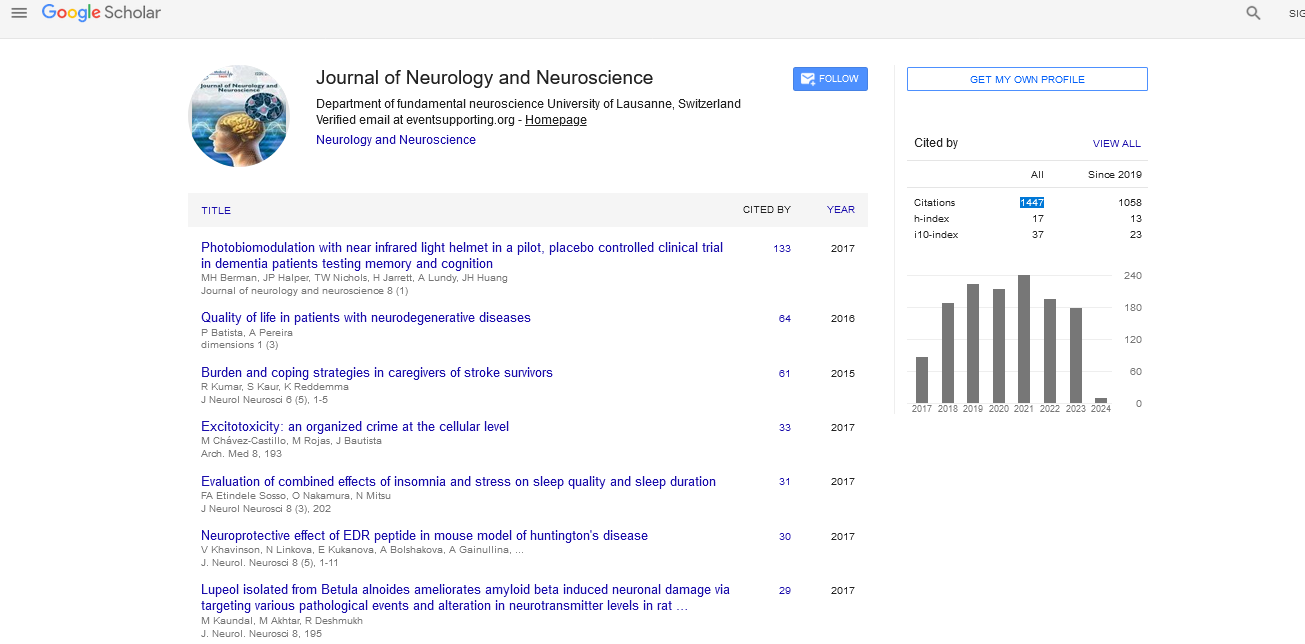Commentary - (2024) Volume 15, Issue 6
Understanding how traumatic stress affects sleep in women and natural remedies for relief
Reheen Velik*
Department of Psychiatry, Mahidol University, Bangkok, Thailand
*Correspondence:
Reheen Velik, Department of Psychiatry, Mahidol University, Bangkok,
Thailand,
Email:
Received: 27-Nov-2024, Manuscript No. ipjnn-25-15493;
Editor assigned: 29-Nov-2024, Pre QC No. P- 15493;
Reviewed: 13-Dec-2024, QC No. Q-15493;
Revised: 18-Dec-2024, Manuscript No. R-15493;
Published:
25-Dec-2024
Abstract
Traumatic stress is a profound psychological and physiological response to life-threatening or intensely stressful events. It can arise from a variety of experiences, including physical, emotional, or sexual abuse, car accidents, or witnessing violent acts. While everyone can be affected by traumatic stress, women are particularly vulnerable, as they are more likely to experience trauma in their lifetime, especially in forms such as sexual assault or domestic violence. One of the most significant and overlooked consequences of traumatic stress is its impact on sleep. Disrupted sleep patterns, insomnia, and nightmares are common symptoms that exacerbate the effects of traumatic stress, leading to a vicious cycle of worsening health and well-being. This article delves into the ways traumatic stress affects sleep in women and explores various naturopathic remedies that can provide relief, restoring the mind-body balance essential for healing
INTRODUCTION
Traumatic stress is a profound psychological and physiological response to life-threatening or intensely stressful events. It can arise from a variety of experiences, including physical, emotional, or sexual abuse, car accidents, or witnessing violent acts. While everyone can be affected by traumatic stress, women are particularly vulnerable, as they are more likely to experience trauma in their lifetime, especially in forms such as sexual assault or domestic violence. One of the most significant and overlooked consequences of traumatic stress is its impact on sleep. Disrupted sleep patterns, insomnia, and nightmares are common symptoms that exacerbate the effects of traumatic stress, leading to a vicious cycle of worsening health and well-being. This article delves into the ways traumatic stress affects sleep in women and explores various naturopathic remedies that can provide relief, restoring the mind-body balance essential for healing [1].
DESCRIPTION
Sleep is a critical component of physical and mental health, and its disruption can significantly affect a person’s ability to cope with stress. Traumatic stress can alter sleep in multiple ways, with women being especially prone to sleep disturbances due to hormonal fluctuations, societal pressures, and a higher incidence of trauma-related experiences. Hyperarousal and Insomnia: One of the hallmark symptoms of traumatic stress is hyperarousal, a state of heightened alertness and constant vigilance. This can make it difficult for individuals to relax enough to fall asleep or stay asleep. Women who experience traumatic stress often find themselves lying awake with racing thoughts or heightened anxiety, unable to quiet their minds at night. This persistent inability to rest leads to insomnia [2]. Traumatic events are frequently re-experienced through nightmares or night terrors. These vivid, distressing dreams related to the trauma can cause individuals to wake up in a state of panic or fear. For women who have experienced sexual trauma or domestic violence, these nightmares can become a nightly occurrence, disrupting their sleep cycle and leading to chronic fatigue. Even when sleep is achieved, it tends to be shallow and fragmented. Stress hormones like cortisol can remain elevated, preventing the body from reaching the deeper stages of restorative sleep. Sleep fragmentation is common in women suffering from PostTraumatic Stress Disorder (PTSD) and can worsen their physical and mental health over time. Traumatic stress impairs the quality of sleep by affecting the body's natural circadian rhythms. Women experiencing stress may also find themselves waking up frequently during the night or too early in the morning, leaving them with feelings 2 − 15 (06) 2022: 001-002 © J Neurol Neurosci 1. Susan DS, Gerrity ET, Muff AM. Efficacy of treatments for posttraumatic stress disorder: An empirical review. J Am Med Assoc. 1992;268:633-638. 2. Laura K, Bessel A, West J, et al. Yoga as an adjunctive treatment for posttraumatic stress disorder: A randomized controlled trial. J Clin Psychiatry. 2014;75:22573. 3. Ronald CK, Sonnega A, Bromet E, et al. Posttraumatic stress disorder in the National Comorbidity Survey. Arch Gen Psychiatry. 1995;52:1048-1060. 4. Elizabeth AY, Breslau N. Cortisol and catecholamines in posttraumatic stress disorder: an epidemiologic community study. Arch Gen Psychiatry. 2004;61:394-401. 5. Victor IS, Montgomery P. Disturbed sleep in post-traumatic stress disorder: secondary symptom or core feature? Sleep Med Rev. 2008;12:169-184. of fatigue upon waking. Sleep is essential for memory consolidation and emotional regulation, and when this quality is compromised, it can exacerbate feelings of depression, anxiety, and irritability [3]. Women experience unique hormonal fluctuations that can significantly influence how traumatic stress affects their sleep. Estrogen and progesterone, the key hormones that regulate the menstrual cycle, have direct effects on sleep patterns. During certain phases of the menstrual cycle or menopause, these hormonal changes can either worsen or alleviate sleep disturbances. For example, in the days leading up to menstruation, women may experience increased anxiety, mood swings, and sensitivity to stress, all of which can contribute to poor sleep. Similarly, women going through menopause may suffer from hot flashes, night sweats, and a disrupted circadian rhythm, all of which can further contribute to insomnia and fragmented sleep. These hormonal fluctuations, combined with the effects of traumatic stress, create a compounded impact on sleep quality and overall health. While conventional treatments such as therapy and medication can be effective in managing the symptoms of traumatic stress, many women seek natural or complementary remedies to alleviate sleep disturbances and address the underlying trauma. Naturopathic treatments focus on restoring balance in the body and mind through holistic approaches that promote physical and emotional healing [4]. Lavender is widely regarded as one of the most effective herbs for promoting relaxation and improving sleep. Its calming properties help to reduce anxiety, alleviate stress, and promote a restful night’s sleep. Women suffering from sleep disturbances due to trauma may benefit from aromatherapy using lavender essential oil, or they can drink a calming cup of lavender tea before bed. Studies have shown that lavender can increase the duration of deep sleep and reduce the frequency of nightmares. Chamomile has been used for centuries as a mild sedative and anxiolytic agent. Chamomile tea is an excellent choice for those experiencing insomnia and anxiety due to traumatic stress. Its ability to calm the nervous system and promote relaxation makes it a gentle and effective remedy for sleep disturbances. Chamomile is especially helpful for women dealing with the emotional aftermath of trauma, as it soothes the mind and helps foster emotional balance. Valerian root is another popular herbal remedy for insomnia and stress. Known for its sedative effects, valerian root can help individuals fall asleep more easily and reduce the time spent awake during the night. It is particularly useful for those who experience racing thoughts and hyperarousal, which are common after trauma. While valerian is effective for improving sleep quality, it is important to consult a healthcare provider before using it, as it can interact with certain medications. Passionflower is a lesser-known herb that has been shown to reduce anxiety and improve sleep quality. It is especially beneficial for individuals who experience restless sleep due to stress, nightmares, or trauma. Passionflower can be consumed as a tea or in supplement form and may help calm the nervous system while promoting restful sleep. Magnesium is an essential mineral that plays a significant role in regulating sleep. It helps relax muscles, calm the nervous system, and promote the production of melatonin, a hormone that regulates sleep-wake cycles. Magnesium deficiency is common in individuals with traumatic stress, and supplementation can improve sleep quality and duration. Foods rich in magnesium, such as leafy greens, nuts, seeds, and whole grains, can also be incorporated into the diet [5].
CONCLUSION
Traumatic stress significantly impacts women’s sleep, contributing to insomnia, nightmares, and poor sleep quality. While conventional treatments like therapy and medication play a role in managing traumatic stress, natural remedies offer valuable support for addressing sleep disturbances. Herbal remedies, nutritional support, and lifestyle practices such as mindfulness, yoga, and aromatherapy can help restore balance and improve sleep quality. By integrating these naturopathic approaches into a comprehensive care plan, women can experience relief from the effects of traumatic stress and regain a sense of restful sleep and emotional wellbeing. As always, it is essential to consult a healthcare provider before starting any new treatment, particularly for individuals with existing health conditions or who are taking medications.
REFERENCES
<ol>
<li><a name="1" id="1"></a><strong>Susan DS, Gerrity ET, Muff AM.</strong> <a href="https://jamanetwork.com/journals/jama/article-abstract/398882" target="_blank">Efficacy of treatments for posttraumatic stress disorder: An empirical review</a>. <em>J Am Med Assoc</em>. 1992;268:633-638.</li>
<p align="right"><a href="https://scholar.google.com/scholar?hl=en&as_sdt=0%2C5&q=Efficacy+of+treatments+for+posttraumatic+stress+disorder%3A+An+empirical+review&btnG=" target="_blank"><u>Google Scholar</u></a>, <a href="https://jamanetwork.com/journals/jama/article-abstract/398882" target="_blank"><u>Crossref</u></a>, <a href="https://pubmed.ncbi.nlm.nih.gov/1629993/" target="_blank"><u>Indexed at</u></a> </p>
<li><a name="2" id="2"></a><strong>Laura K, Bessel A, West J, et al.</strong> <a href="https://www.psychiatrist.com/jcp/trauma/ptsd/yoga-adjunctive-treatment-posttraumatic-stress-disorder/" target="_blank">Yoga as an adjunctive treatment for posttraumatic stress disorder: A randomized controlled trial</a>. <em>J Clin Psychiatry</em>.2014;75:22573.</li>
<p align="right"><a href="https://scholar.google.com/scholar?hl=en&as_sdt=0%2C5&q=Yoga+as+an+adjunctive+treatment+for+posttraumatic+stress+disorder%3A+A+randomized+controlled+trial&btnG=" target="_blank"><u>Google Scholar</u></a>, <a href="https://doi.org/10.4088/jcp.13m08561" target="_blank"><u>Crossref</u></a>, <a href="https://pubmed.ncbi.nlm.nih.gov/25004196/" target="_blank"><u>Indexed at</u></a> </p>
</ol>





